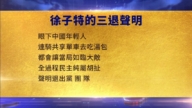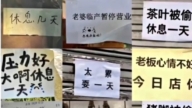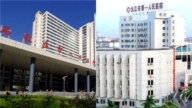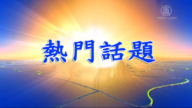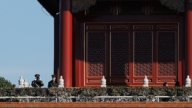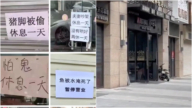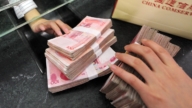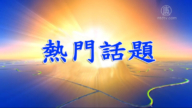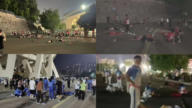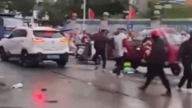【新唐人2012年7月2日讯】日前,中共主席胡锦涛到港出席香港回归15周年纪念活动,香港各界人士组织了多次示威游行,抗议中共对中国民众人权等方面的践踏。为营造庆祝活动的良好气氛,大陆官方媒体则对香港政治、经济等方面进行了大量正面报导。不过,报导反映出的两地巨大差距,却引起了大陆民众对中国社会治理和政治制度的反思。
从胡锦涛6月29号到达香港,到7月1号中午前离开,香港支联会和各界民众的抗议示威可以说是如影随形。“法轮大法好”、“平反六四”、“彻查李旺阳死因”等横幅频频出现在胡锦涛出席活动的路途中。
在湾仔会展中心举行的香港第四任行政长官梁振英就职典礼上,有公民党成员向胡锦涛大喊“结束一党专政”。“七一”大游行的人数更是远远超过预期的5万人。
面对香港民众的不满和抗议,中共当局试图利用媒体为庆祝活动创造良好的气氛。官方媒体突出报导大陆对香港的支持,并强调了香港的反腐成绩和民主发展。
“英国广播公司”《BBC》认为,这些报导恰恰让中共当局“后院起火”。由于大陆民众看到香港政府廉洁,法制健全,食品安全有保障,许多人提出疑问:同是中国公民,香港人有的,为什么大陆人无法企及?
6月初,《中国青年报》曾登出头版文章《香港:对腐败“零容忍”》;7月1号,《新京报》又称赞香港有运作良好的廉政体系,对腐败“零容忍”。网友们由此联想到了大陆贪腐盛行的现状。
另外,香港新任特首梁振英的“住宅违建丑闻”,导致自家住房违建部分被清拆,不得不向公众道歉。大陆网民发出感慨,说:“大陆强拆屁民的房子,香港拆特首的房子,差距啊!”
浙江民主人士来金彪认为,回归前,香港民众在英国的民主领导方式下,“民主”的概念深入人心,甚至已经形成了一种生活方式。中共为了平复香港民众,抛出了所谓的“一国两制”,但从某种意义上讲,这是对大陆民众的侮辱。
浙江民主人士来金彪:“(大陆)老百姓受冤屈了以后,要去诉冤也必须要得到他(中共)同意,他认为你可以诉冤你才可以去诉冤;他不同意你诉冤你就不能诉冤。所以呢,才出现了一个合法上访和非常上访之分。这在全世界都是一个大笑话。而且这个大笑话只有在伟大,光荣,正确的(中共)指导下才实现的。”
《BBC》文章还举例,在大陆,有毒食品泛滥,但提供给香港的食品安全率却达到了99.999%。《广州日报》在一个社评中说:“供港食品99.999%的安全率说明:原来食品安全并非像某些官员、‘御用’专家所说的那样艰难,‘阶段论’、‘国情论’可以休矣。”
有网民戏称,这是食品安全领域的“一国两制”。更有网友质问当局:“大陆人永远是次等公民吗?”
大陆自由撰稿人刘逸明认为,香港的民主制度和司法独立,对食品安全和保护民众的利益起到了很关键的作用,然而大陆的专制制度却决定了有毒食品必然泛滥。
刘逸明:“你看毒奶粉那麽猖獗,但赵连海就因为帮毒奶粉受害家庭包括自己进行维权,结果不但没有效果,反而被抓进监狱判几年刑。这就是中国的现实。根子还是在这个社会制度不民主上面。”
不过,刘逸明坦言,香港的民主自由度,在北京当局的压制下正在逐年下降。
《BBC》也认为,香港的新闻自由和政治民主化仍然面临诸多挑战。但是,香港的法治、民主和自由正在激励大陆民众要求变革的诉求,并使独裁的中共当局越来越难以自圆其说。
采访/刘惠 编辑/李明飞 后制/钟元
The Chinese Communist Party’s (CCP) publicize Hong Kong’s
achievements creates visibility of the CCP’s double standards
CCP president Hu Jintao’s stayed in Hong Kong to attend
activities marking 15th anniversary of Hong Kong’s handover.
Various groups organized protests about Chinese Communist
Party (CCP)’s violating human rights of Chinese people.
To create an ambience of celebration, the CCP’s mouthpiece
media have made a lot of positive reports on Hong Kong’s political and economic achievements.
However, these reports also reflect the huge difference
between China mainland and Hong Kong.
This has induced many Chinese to rethink the CCP’s governing
actions under its dictatorship regime.
Hu Jintao arrived in Hong Kong on June 29th and left noon
on July 1st.
The Hong Kong Alliance in Support of Patriotic Democratic
Movements of China and other groups protested wherever Hu went and stayed.
Banners such as"Falun Dafa is good", “Vindication of
Tiananmen Square incident” and
“A thorough investigation of Li Wangyang’s death"
appeared frequently on Hu’s way to attend activities.
At Leung Chun-ying’s swearing-in ceremony as the fourth
Chief Executive of Hong Kong,
a Civic Party member shouted to Hu Jintao
“Bring to an end of the one-party dictatorship".
Furthermore, the number of people attending the July 1st
Parade far exceeded the expected 50,000.
Having such massive protests from Hong Kong people,
the CCP tried to create an ambience of celebration via its media.
Most official reports concentrated on validating Hong Kong’s
achievements on anti-corruption and democratic development.
Also how the CCP via the mainland has supported Hong Kong
since the handover.
A BBC report pointed out that these reports had caused the
CCP trouble inside the China mainland.
As many found that Hong Kong had clean government,
sound legal system and safe food,
they questioned why the Chinese in the mainland could not share
the same as Hong Kong people as both of them are Chinese citizens.
In early June, the China Youth Daily published a front-page
article titled “Hong Kong: zero tolerance to corruption”.
On July 1st, the Beijing News again complimented Hong Kong’s
anti-corruption system in its report.
Many netizens consequently connected these reports with
rampant corruptions in the mainland.
In addition, the new Chief Executive Leung Chun-ying
apologized to the public for his “illegal building scandal".
The illegal part of his house was also removed.
Chinese netizens remarked that, “in the mainland the CCP
demolishes civilians’ houses;
in Hong Kong the CCP removes the Chief Executive’s house;
what a difference!"
Zhejiang democrat Lai Jinbiao said that Hong Kong people had
incorporated democracy into their living styles under the United Kingdom’s governing before the handover.
The CCP had to throw out the policy of “one country,
two systems" to cater to Hong Kong people;
However, this is a humiliation to the mainland people in
some sense.
Lai Jinbiao, Zhejiang democrat says:" mainland people are
badly treated and can only petition if allowed by the CCP.
If the CCP doesn’t allow you to do that, you can’t.
Therefore in China there is a difference between the
so-called ‘legal petition’and ‘illegal petition’.
This is a joke to the global society, which could only happen
under governing of ‘the great, the bright, and the right’ (party)."
The BBC’s report also wrote that compared to the mainland
with widespread poisonous food, Hong Kong’s food safety was guaranteed to a ratio of 99.999%.
A Guangzhou Daily’s editorial since remarked that “Hong Kong’s
99.999% food safety ratio shows that
solving the food safety problem is not as hard as
some officials and “official" experts have claimed.
It’s time to end the theories which say that it takes time to
solve the problem or the situation is special in China."
Some netizens ironically said this indicated how “one country,
two systems" had been applied in food safety.
Another netizen questioned the CCP authority, “why should
mainland Chinese always be regarded as inferior citizens?"
Mainland freelancer Liu Yiming believes it is Hong Kong’s
democratic regime and judicial independence that
play key roles in protecting civil benefits in food safety
and other fields;
However the dictatorship regime in China mainland inevitably
led to overflow of poisonous food.
Liu Yiming says: “The poisonous milk powder problem being
so serious in China,
Zhao Lianhai was still put into prison for trying to protect
the rights of the victims, including his own family.
This is the reality in China.
The problem roots in the non-democratic regime."
Liu Yiming also made an honest remark that the freedom in
Hong Kong was being damaged every year under the CCP.
The BBC said that there were still challenges in protecting
Hong Kong’s freedom of information and political democracy.
however, the freedom, the democracy and the rule of law
in Hong Kong still encouraged mainland Chinese
to request political reform,
and made it harder for the CCP to glorify
its dictatorship regime.


